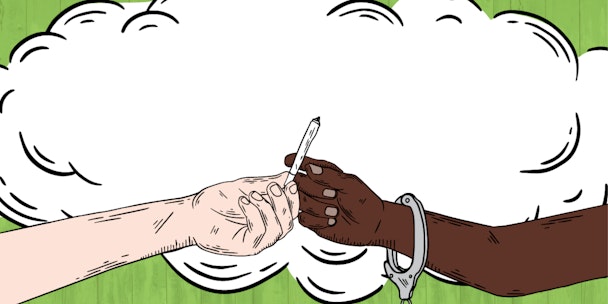Ben & Jerry’s activism chief on fighting for the causes currently being neglected
While brands the world over rewrite their plans to focus on the coronavirus pandemic, Ben & Jerry’s – the grand dame of corporate purpose – is staying committed to campaigning for causes such as racial justice. Its head of global activism strategy explains the nuances of this approach.

Ben & Jerry's focused on Black incarceration this 420
Ben & Jerry’s may be one of the first brands you think would respond openly to a moment of global crisis. Alongside the likes of the Body Shop and Patagonia, the ice-cream maker was one of the first to bake social, environmental and oftentimes political values into its brand.
A timeline of its causes since launching in 1978 shows a brand that has grown in confidence; it began with matters pertaining to its home state of Vermont but now counts peace building, LGBTQ+ rights and the safety of refugees as global issues it care about.
So, while the world’s attention is caught by limiting the spread of the coronavirus, Ben & Jerry’s has chosen to continue battling for the causes that may have temporarily fallen to the back of society’s mind.
“What I appreciate about what we do is that we do the things that are important – not just the things that are easy,” says Christopher Miller, Ben & Jerry’s head of global activism strategy. “We don’t just join the rest of the crowd. I think that’s a defining feature of our approach.”
This week, its campaign around 420 (the 20 April celebration of cannabis culture) ignored those getting high in lockdown and instead highlighted the racial injustices tied up in the cannabis industry.
“In states where cannabis is legal, and even though black people and white people partake at similar rates, black people are still arrested way more often,” it wrote in a blog post. “We love 420 and we love legalization, but that’s not OK.”
The brand published a series of posts, quizzes and films on the racial bias tied up in the emerging weed mainstream under the banner ‘Legalization without justice is half baked’. It was a continuation of its ongoing support of Black Lives Matter and its irreverent nods to those who celebrate 420 (last year, it gave away free ice-cream to those who bought marijuana at dispensary Caliva on 20 April).
“Our audience base does skew white,” explains Miller. “You can even see it on our limited edition tubs with Stephen Colbert and Jimmy Fallon. So we thought 420 was important and a good opportunity to draw attention to and educate people on the facts of black injustice.”
Some marketers may not have considered it a good time to launch. With the news cycle in a frenzy and consumers either distracted or exhausted, swathes of planned campaigns have been canceled in the wake of the outbreak. Ben & Jerry’s did discuss pulling the 420 initiative at one point too. “But it was one conversation, and it was a brief one,” says Miller.
Perhaps the difference between this campaign and those from other brands is the ROI. Miller’s task was not to sell more pints of ice-cream – it was to get 15,000 people writing to Congress and asking their representatives to support the More Act (Marijuana Opportunity, Reinvestment and Expungement), which would legalize cannabis and expunge prior cannabis convictions.
By 21 April, more than 65,000 messages had been sent to legislators and Ben & Jerry’s 420 work had racked up 120m impressions online. Miller believes this shows the “huge appetite” for causes to support outside of the immediate health crisis.
Ben & Jerry’s will continue to work with the American Civil Liberties Union (ACLU), taking cues from the organization on how it should evolve its work around legalization and black justice. It will also continue to campaign for refugee rights in Europe and plans to double down on demands for a “robust election system” in time for a US presidential election that may be hindered by shelter-in-place orders.
“We are going to be working with other companies and NGOs – beginning immediately – to advocate for ... funding and a set of guidelines to ensure a free and fair access to the election in the fall,” Miller explains. “We’re looking at extended early voting, online voter registration in all 50 states, mail-in voting systems and robust voter education programs.
“That’s work we hadn't anticipated prior to coronavirus and it’s work we’ll be moving forward with to ensure the rules and resources are in place for everyone to access the electoral process this fall.”
The positive Miller gleans from the pandemic is an increased consumer demand for corporations to make a difference to society beyond philanthropy. He believes corporations will be forced to take a leaf out of Ben & Jerry’s 42-year-old playbook as expectations shift post-coronavirus. And that means he’ll have to work harder to establish the brand as a real leader in the field of corporate purpose.
“Part of my role is pushing as hard as I can to keep Ben & Jerry’s as close to the front of the pack of companies working in this space as possible,” he says. “As the middle moves ... the challenge for us at Ben & Jerry’s to be even more creative, innovative and focused on impact.
“I’m hopeful that that is one of what I imagine will be a number of ways we can come out of this crisis stronger than we went into it.”

Content created with:

Ben & Jerry's
Ben & Jerry's consumer services portal has all the necessary details to connect with them about their ice cream.
Find out more
